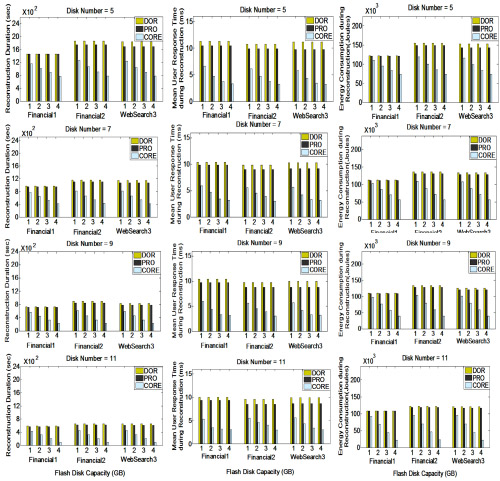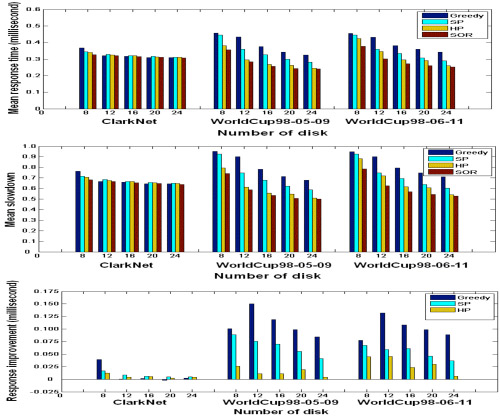Xiao Qin's Research
Final Report
BUD: A Buffer-Disk Architecture for Energy Conservation in Parallel Disk Systems
Download BUD Annual Report PDF
Findings
An Energy-Efficient Framework for Large-Scale Parallel Storage Systems
A Simulation Framework for Energy-efficient Data Grids
An Energy-Efficient Scheduling Algorithm Using Dynamic Voltage Scaling
for Parallel Applications on Clusters
Load-Balancing Strategies for Energy-Efficient Parallel Storage Systems with Buffer Disks
Sacrificing Reliability for Energy Saving: Is It Worthwhile for Disk Arrays
Load-Balancing Strategies for Energy-Efficient Parallel Storage Systems with Buffer Disks
Energy-Efficient Prefetching for Parallel I/O Systems with Buffer Disks
Improving Reliability and Energy Efficiency of Disk Systems via Utilization Control
Energy Conservation for Real-Time Disk Systems with I/O Burstiness
An Adaptive Energy-Conserving Strategy for Parallel Disk Systems
DARAW: A New Write Buffer to Improve Parallel I/O Energy-Efficiency
MICRO: A Multi-level Caching-based Reconstruction Optimization for Mobile Storage Systems
PEARL: Performance, Energy, and Reliability Balanced Dynamic Data Redistribution for Next Generation Disk Arrays
HyBUD: An Energy-Efficient Architecture for Hybrid Parallel Disk Systems
Energy-Aware Prefetching for Parallel Disk Systems
DORA: A Dynamic File Assignment Strategy with Replication
Collaboration-Oriented Data Recovery for Mobile Disk Arrays
A File Assignment Strategy Independent of Workload Characteristic Assumptions
References
[Xie and Sharma, 2009]
Mobile disk arrays, disk arrays located in mobile data centers, are crucial for mobile applications such as disaster recovery. Due to their unusual application domains, mobile disk arrays face several new challenges including harsh operating environments, very limited power supply, and extremely small number of spare disks. Consequently, data reconstruction schemes for mobile disk arrays must be performance-driven, reliability-aware, and energy-efficient. In this paper, we develop a flash assisted data reconstruction strategy called CORE (collaboration-oriented reconstruction) on top of a hybrid disk array architecture, where hard disks and flash disks collaborate to shorten data reconstruction time, alleviate performance degradation during disk recovery. Experimental results demonstrate that CORE noticeably improves the performance and energy-efficiency over existing schemes. Compared with DOR, CORE on average reduces reconstruction duration and mean user response time during reconstruction by 50.4% and 65.3%, respectively. In terms of energy consumption, CORE on average saves energy by 43.4%. Compared with PRO, CORE on average shrinks reconstruction duration and mean user response time during reconstruction by 48.2% and 61.9%, respectively. In addition, CORE saves energy on average by 42.5%.

[Xie and Sun, 2009] The problem of statically assigning non-partitioned files in a parallel I/O system has been extensively investigated. A basic workload characteristic assumption of most existing solutions to the problem is that there exists a strong inverse correlation between file access frequency and file size. In other words, the most popular files are typically small in size, while the large files are relatively unpopular. Recent studies on the characteristics of web proxy traces suggested, however, the correlation, if any, is so weak that it can be ignored. Hence, the following two questions arise naturally. First, can existing algorithms still perform well when the workload assumption does not hold? Second, if not, can one develop a new file assignment strategy that is immune to the workload assumption? To answer these questions, we first evaluate the performance of three well-known file assignment algorithms with and without the workload assumption, respectively. Next, we develop a novel static non-partitioned file assignment strategy for parallel I/O systems, called static round-robin (SOR), which is immune to the workload assumption. Comprehensive experimental results show that SOR consistently improves the performance in terms of mean response time over the existing schemes. Experimental results show that when the distribution of access rates across the files and the distribution of file sizes were inversely correlated with the same skew parameter θ, SOR consistently improves the performance of parallel I/O systems in terms of mean response time over three well-known file assignment algorithms. Compared to SP, one of the best existing static non-partitioned file assignment algorithms, SOR obviously achieves improvement in mean response time. When the correlation between file access frequency and file size is negligible, SOR still consistently performs better when file size exhibits a uniform distribution.
